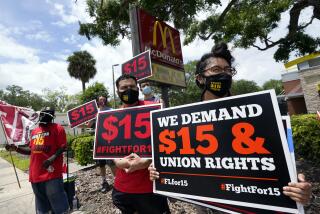Lawsuit Is Remedy for Hiring Bias
QUESTION: With all the talk about the new immigration reform law, I haven’t read anything about what happens if someone who is rejected for a job turns out to have been a perfectly legal candidate. Do you know?--E. G.
ANSWER: Although justice in such cases may be long in coming, the best recourse is a discrimination lawsuit against the employer. The new law also provides for fines of at least $1,000 in such cases.
Q: I know you’ll think I was silly to do this, but I have almost all of my savings in one savings and loan association. I plan to take a lot of it out as soon as the certificates of deposit expire and will no longer face any penalties for early withdrawal. But in the meantime, could you help put my mind to rest? Is my IRA subject to the $100,000 insurance limitation? Or is that considered separately?--U. H.
A: IRAs are insured separately--as are Keoghs, which are individual retirement accounts for the self-employed. Each has its own $100,000 insurance limit per financial institution.
And don’t forget that if you have more than $100,000 built up in other types of savings at your S&L; you are still fully covered if you have them divided up into different legal entities. That is, if you have no more than $100,000 in a savings account in your own name and another $100,000 in a joint account with your spouse, the entire $200,000 is fully covered by the Federal Savings & Loan Insurance Corp., the 53-year-old federal agency that insures accounts in member S&Ls.;
Q: My husband and I are thinking about starting a housekeeping business, aimed at two-worker couples who don’t have the time to clean their own houses. Do you have any idea how many businesses like it already exist?--P. H.
A: The Commerce Department estimates that there are 22,000 such businesses doing collective annual sales of $5 billion.
The vast majority of those businesses are franchises--that is, businesses that are owned and operated by individuals but that use the name, and thus the marketing clout, of a larger corporation. Many fast-food operations are franchises. In fact, the Commerce Department estimates that fully one-third of all U.S. retail sales are derived from franchises.
For more information on how to franchise and what you can expect of your competition, send $4.75 to the Superintendent of Documents, Washington, D.C. 20402 and ask for the “Franchising in the Economy: 1985-1987” report. You’ll get the report faster if you also include its stock number: S/N 003-008-00202-1.
More to Read
Inside the business of entertainment
The Wide Shot brings you news, analysis and insights on everything from streaming wars to production — and what it all means for the future.
You may occasionally receive promotional content from the Los Angeles Times.










